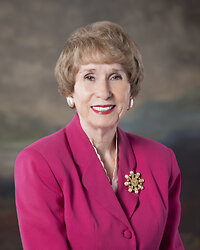In the previous column, we were examining the traits of a healthy family. We started off examining the rituals and traditions that help keep families healthy. In this column, the trait we're taking a closer look at is self-esteem. Children's self-esteem will show up when they trust themselves enough to try new things. Parents can help in this area by not expecting them to do everything perfectly, not being critical, and encouraging them to keep trying. How we as parents handle our own mistakes and failures will model to children how to handle theirs. We are good models when we don't let our mistakes describe us. I like the slogan, "Label actions, not people."

It is important to remind ourselves as we teach our children to turn their mistakes or so called "failures" into opportunities to learn and grow. Robert Wicks in his book Touching the Holy suggests that a positive way of dealing with our errors and shortcomings is not to see them as "proofs" that we are lacking but to use what he calls "positive paradox." Positive paradox is seeing our mistakes as growing edges or challenges for growth. Rollo May wrote: "High self-esteem does not protect us from self-doubts, but it does enable us to entertain self-doubts without being devastated."
We want to be parents who
encourage our children. There is
a difference between praise
and encouragement.
Following is a list of principles we want to teach our children by what we say and how we relate to others and to ourselves.
1. We want to be parents who encourage our children. There is a difference between praise and encouragement. The problem with praise is that we look externally for self-acknowledge. It is like putting ourselves in the hands of others and asking them, "What must I do to get your approval?" One of the problems is that if praise doesn't match how we feel about ourselves, we won't accept it. We must encourage children to affirm themselves. We encourage them by asking, "How did you feel accomplishing that task? Did you feel good about what you did?"
2. Teach them to challenge irrational thinking. One irrational thought is, "I must be perfect or successful all the time."
3. One of our goals in parenting is teaching our children to have good manners. Unfortunately, in our society, manners are seen by some as a weakness. Manners have to do with respect and honor.
4. Dwight Eisenhower said that one of the ways his self-esteem came about was by having chores and responsibilities. His family heated their home by a coal furnace. Dwight's job was to get up early every morning and stoke the furnace. He knew his family depended on him for heat. Self-esteem does not come by getting but by giving. It is through giving that we know we are making a difference and are contributing.
Dr. William E. Austin is a licensed psychotherapist and holds a Doctor of Divinity degree. He is a therapist with Tidewater Pastoral Counseling Services . He is well known for his warmth and sense of humor. His book, Creating Our Safe Place - Articles on Healthy Relationships, can be purchased through www.amazon.com.
Tidewater Pastoral Counseling: 623-2700
CURRENT COLUMNS
Children First 
Dandelion Timeby Becky AdamsRelationships 
When Your Security Blanket is in the Dryerby Dr. Bill AustinOn The Front Porch With You 
Memories of Homeby Rob LauerPublisher’s Point 
Time To Moveby Jean Loxley-Barnard

